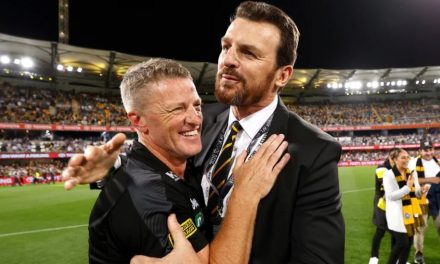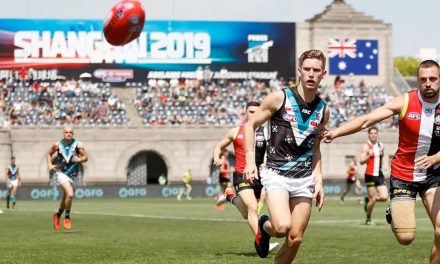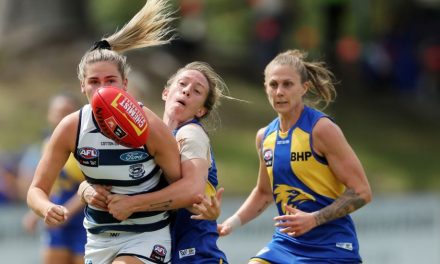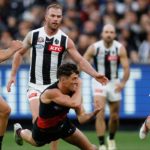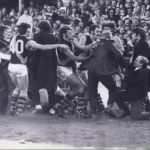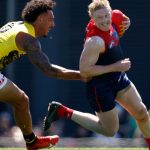(From left): Callum Brown, Jayden Short and Blake Hardwick all made the switch from one end of the ground to the other.
In the rookie draft at the end of 2014, Richmond recruited skillful small forward Jayden Short and speedy half-back Jason Castagna with its first two picks.
It wasn’t take long before the Tigers realised that while Short’s absence of a maniacal defensive mindset limited his ability to contribute to a finely-tuned forward system, his kicking would be highly effective in clearing zones from the back half.
Similarly, Castagna’s wayward ball use would hurt the team coming out of defence, but his pace, agility, and experience as a lockdown backman could be essential inside 50.
Short had played forward because he is a natural attacker, and Castagna down back because he’s a natural defender. But coach Damien Hardwick understood something that is now commonplace across the league: in modern footy, your small forwards are your defenders, and your small backs are often your attackers.
Scores from clearance are rare. Most sides generate opportunities from half back, where the best ball users are deployed, or from front-half turnovers, where your most defensively-minded now reside. The two became among Hardwick’s first-picked in a highly successful era.
Hardwick has taken the Castagna-Short paradigm with him to Gold Coast. Within weeks, he’d swapped tough defender Ben Long and career forward Alex Sexton.
Sexton provides an interesting case study for several reasons. Despite being the Suns’ second greatest ever goalkicker, he regularly found himself out of Stuart Dew’s line up, even at times when the side couldn’t buy a goal. Hardwick’s comments from March this year paint the picture.
“He’s got a skill set; great user of the ball, a great aerobic capacity and reads the play really well,” he said. “From a forward line perspective, his type didn’t quite fit what we were after at that end of the ground.”
The translation here is that he can kick, but he does not buy into the defensive principles required to play a Hardwick-style, or perhaps any forward system.
Think of any skillful half-forward or crumber who is continually overlooked for selection despite a natural nous for the sticks, and the answer is always the same. You only need one player not doing it for the whole thing to fall apart.
PLEASE HELP US CONTINUE TO THRIVE BY BECOMING AN OFFICIAL FOOTYOLOGY PATRON. JUST CLICK THIS LINK.
Another Hardwick, Hawthorn’s Blake, was shifted forward against Collingwood the weekend before last to great effect. This is something the Hawks have wanted to do for a while, and it was easy to see why.
But Hardwick was not moved back to the position where he kicked piles of goals as an under 18 just because he can put them through. Coach Sam Mitchell knows he can be relied on to maintain required defensive elements because he’s seen him do it through two podium finishes in the Peter Crimmins Medal playing as a miserly back-pocket.
Callum Brown of the Giants is another recent success-story moving back to forward, a five-goal haul in Opening Round highlighting his rise.
But you only have to look at recent history to know that forward craft has changed. Stephen Milne, widely acknowledged as one of the great small forwards of the modern era, averaged 1.71 tackles per game across his career.
Forward 50 defence is more than just tackling, but based on 2023’s numbers, this figure would rank him outside the top 100 among small forwards who regularly play.
This is not to say that things have changed so drastically that Milne would be a fringe player in modern footy. But he would’ve had to become a slightly modified version of himself. Or perhaps he would’ve been a great half-back-flanker.
This tackling phenomenon is even starting to land with the big men. Jason Dunstall, who is often regarded for his defensive and team-oriented play compared to his contemporaries, averaged a “whopping” 0.75 tackles per game. Compare that to recently-retired stars of his position like Lance Franklin (2.5) and Josh Kennedy (2.2).
So how are the moves faring so far this year? Hardwick up forward looks like a good one for the Hawks. Swan Robbie Fox has played forward not to kick bags, but to mind the medium defender intercepting superstars, with mixed results.
Sexton hasn’t worked out for Gold Coast. But the Castagna-Short paradigm lives on, with the role handed to another forward in Jack Lukosius, who has enjoyed three productive weeks.
It has always made sense to put players where they’re likely to have the best chance of success. But now, the winning formula has shifted.


